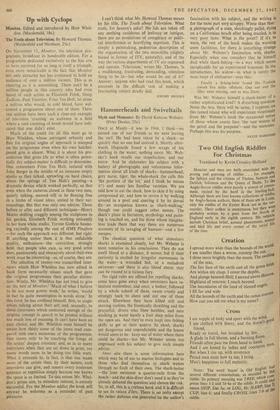Up with Cyclops
Monitor. Edited and introduced by Huw Whel- don. (Macdonald, 18s.) The Truth about Television. By Howard Thomas. (Weidenfeld and Nicolson, 25s.) ON November I Monitor, the television pro- gramme, broadcast its hundredth edition. For a programme dedicated exclusively to the fine arts to have survived for so long is itself a triumph; even more remarkable is the fact that Monitor not only attracted but has continued to hold an audience of over a million viewers. This is as cheering as it is astonishing. There can't be a million people in this country who had even heard of such artists as Elisabeth Frink, Ossip Zadkine, Paul Tortelier, Friso Ten Holt, let alone a million who would, in cold blood, have wel- comed a programme about one of them. There can seldom have been such a clear-cut example of television 'creating' an audience in a field where a cool counting of heads would have indi- cated that one didn't exist.
Much of the credit for all this must go to Huw Wheldon, whose astringent urbanity and flair for original angles of approach is stamped on the programme even when his own hatchet- jawed grin is absent. What it is about his pre- sentation that gives life to what is often poten- tially dry subject-matter is difficult to determine. One remembers Friso Ten Holt, isolated with John Berger in the middle of an immense empty studio as they talked, sprawling on hard chairs, about the springs of Ten Holt's painting—a dramatic device which worked perfectly, so that even when the cameras. closed in these two men, quietly talking, seemed still to be floating free in a limbo of visual ideas, untied to their sur- roundings. But that was only one edition. Those before or after used different techniques—Henry Moore drifting craggily among the sculptures in his garden, Elisabeth Frink working reticently in her bare white studio, Tyrone Guthrie bounc- ing excitedly among the cast of HMS Pinafore —for each the approach was different, but right. If anything unites them it is that unfakable quality, enthusiasm—the conviction, strongly held, that people who care, as any good artist does, passionately and obsessively about their own work must be interesting—as, of course, they are.
The selection of twenty-two transcribed inter- views which Huw Wheldon has now edited in book form necessarily misses much that gave the original programmes their peculiar distinc- tion. Wisely, Mr. Wheldon has not tried to give us 'the best of Monitor.' Much of what I believe to be our most potent work,' he writes, 'would in fact be quite meaningless in words alone.' In this book he has confined himself, first, to single artists talking about their art; and, secondly, to those interviews which contained enough of the original concept in speech to be printed without too much loss of meaning. It can't have been an easy choice, and Mr. Wheldon must himself be aware how thinly some of the items read com- pared with one's memories of the programmes. One seems only to be touching the fringe of the artists' deepest interests; and, as in so many interviews when they are set down in print, too many words seem to be doing too little work. What it amounts to, in fact, is that one wants more of the artists than, by their nature, such interviews can give, and resents every irrelevant sentence or repetition simply because one knows the space is so limited. To this extent Mr. Whel- don's prime aim, to stimulate interest, is entirely successful. For the Monitor addict the book will anyway be welcome as a reminder of past pleasures. I can't think what Mr. Howard Thomas means by his title, The Truth about Television. What truth, for heaven's sake? No lids are taken off any seething cauldrons of jealousy or intrigue, there are no revelations of conspiracy or politi- cal interference or horrifying nepotism. This is simply a painstaking, pedestrian description of the organisation of the two monoliths (slightly biased in favour of ITV, naturally), and of the way the various departments of TV are organised and operate. 'Television,' writes Mr. Thomas, 'is a maddening, frustrating, demanding, relentless thing to be in—but who would be out of it?' Answer : anyone who had read this book, which succeeds in the difficult task of making a fascinating subject deadly dull.
JEREMY BROOKS




























 Previous page
Previous page